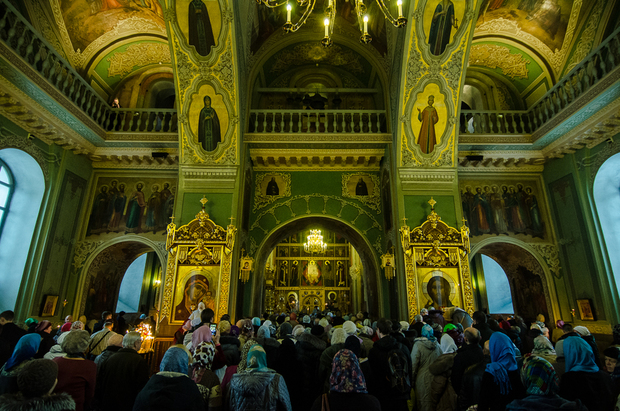Vsevolod Chaplin: ‘We shouldn’t disregard the centuries-long link of sermons' language with the culture of ethnicity’
Former Head of Synodal Department of ROC expressed his opinion on the discussion about the obligatory introduction of the Tatar language at Friday sermons
A public debate took place last week between muftis of Moscow and Tatarstan on the Friday sermons in the Tatar language that have become obligatory in the Republic. Ildar Alyautdinov and Kamil Samigullin brought forward their arguments for Relanoe Vremya. A columnist of our newspaper Vsevolod Chaplin has also joined the discussion. In his column written specially for Realnoe Vremya he as an outside observer states his opinion in this dispute, as ROC (the Russian Orthodox Church) and other churches also often face the same issues connected with universal values and native language.
Modern speech or 'eternal' languages
What language of worship and preaching should be? There are discussions on that topic in various religious societies – from those that appeared thousands of years ago to those that appeared 20-30 years ago. A similar discussion has recently been started among the Muslims in Tatarstan.
The logic of such 'head-on' missionary work, particularly of modern political, advertising and public relations technologies, as if suggests: you should be clearer and simpler and then you will succeed. Many advisers and critics, especially from the external environment, push the religious leaders to that model of 'transmission of message'. Some communities followed this advice and, oddly enough, lost themselves and then disappeared. The most striking examples — a number of 'trendy' in the 1960s and 1970s Protestant associations in North America, Western Europe and South Korea. These groups, having adopted the most modern for their period style and vocabulary, turned out to be a project of one generation because the religious life does not suggest a quick change of styles, so they failed to transfer in the 1980s from rock to disco, and in the 1990s to rap. As a result, many communities sank into oblivion along with the old fashion.
At the same time, the Western ('Catholic') Church, which had long been blamed for strange Latin, and eventually impelled to abandon it, have stood for two thousand years and began to lose the peoples of Western Europe at this particular time when it has transferred to seemingly 'convenient' modern languages, many of which, however, were born from the same Latin. Orthodox churches — Greek, Russian — do not plan to abandon the ancient languages and are in a state of stability or revival. Islam does not refuse to learn Arabic and also is not experiencing the slightest problem with the number of believers. The same can be said about traditional Judaism, where almost obsolete ancient language has received a new development, having become one of the modern languages.

'Islam does not refuse to learn Arabic and also is not experiencing a slightest problem with the number of believers.' Photo: Maksim Platonov
Simplification will be a deception
What's the matter? Can it be true that in the sphere of religion there is a logic just the opposite those that is in the field of politics, advertising and PR? You can be surprised – it is true. The aim of a believer especially of a missionary or a preacher – not to 'be elected', not to 'flog goods' and not 'to please'. Christ in the gospel warned his disciples: 'Woe unto you, when all men shall speak well of you!' (LK. 6, 26). The goal of a preacher is not to make himself and others a comfortable life on earth but to open the everlasting heavens. And this very purpose in many ways is opposite to the political, advertising, and public relations one.
And here the most interesting begins. God and the realities of the heavenly world — at least in the Christian sense — are quite difficult to describe in simple words. God is incomprehensible in earth categories, and that is why Orthodox spiritual heritage tried to describe rather what He is not, and not to propose a coherent system of His 'exhaustive' definition. The real Christian liturgical and theological texts are quite complex, and simple translation would not facilitate their understanding, while 'reduction' of these texts to the culture of comics and advertising slogans will only confuse people further, withdrawing them from the real contemplation of God. Yes, aphoristic sayings of the shepherds, blessed fools, and the gospel itself are no less important than the theological treatises. But these words sometimes cannot be called 'simple' to understand for a person accustomed putting the freedom of a sin above all.
Theology and worship in true Christianity – it is not about 'old' but eternal. Not only about 'tradition' but about things transcendent. So, a 'simplification' in this case is always a kind of deception.

'Theology and worship in true Christianity – it is not about 'old' but eternal. Not only about 'tradition' but about things transcendent.' Photo: Oleg Tikhonov
Sermons in Russian language: will they help?
Almost all religions of the world embrace people of different nationalities. And, of course, in many religious circles, there is a temptation to universalize the language of sermons and prayers. Someone among modern Muslims will say that the common language must be Russian or Arabic. In the Orthodox environment, not only in the West but also in Russia, I met people who consider English liturgical texts more understandable than Church Slavonic. Late Metropolitan Anthony (Bloom), who served in London, told me about this: 'An interesting phenomenon.' In fact, if modern cities are becoming more international, why not serve in English…
Yes, for the convenience of people who do not speak a local language, such state of affairs may be useful. For example, the migrants from Soviet Central Asia speak Russian better than Tatar, sermons in the state language will not only help them to learn it but also will contribute their integration in the local community. It will promote neutralization of extremist influence who often preach among the diasporas language strange to the general population of the country and even to the law enforcement officers.
However, we should not disregard the centuries-long link of a language of sermons with a culture of an ethnicity. It is beneficial to break that link, depriving Russians and Tatars, Jews and Buryats of national-religious identity only for those who wish to turn people and peoples with their unique characters into an easy-manageable herd of 'omnihumans', whom it is possible to format to any standard of politics, advertising or PR. If we do not want to be like that, we must defend the right for identity, including ethnic and religious ones. 'Omnihuman standard' in this case can't help. That is why we should admit it not as 'universal', not the most progressive but only one of many. Not the worst, but not the best, not better than identities of particular peoples and religious societies.